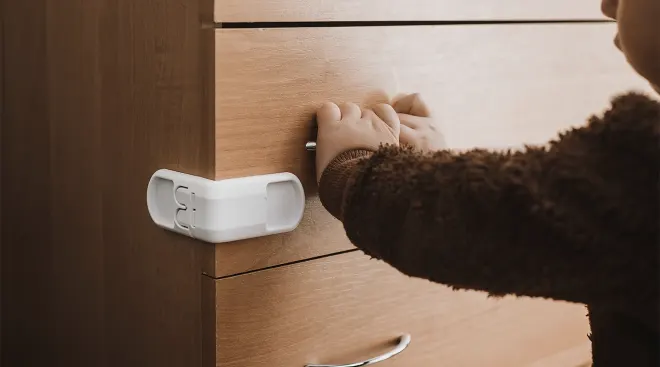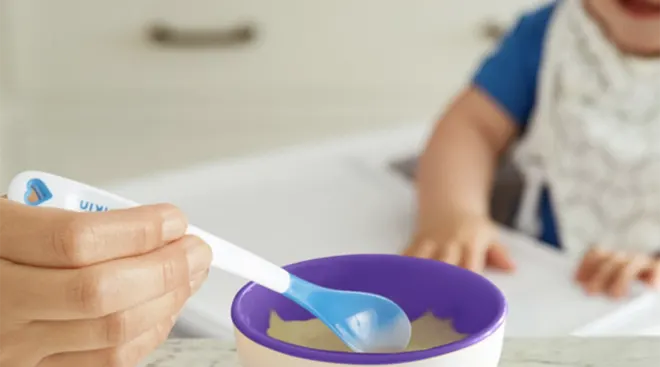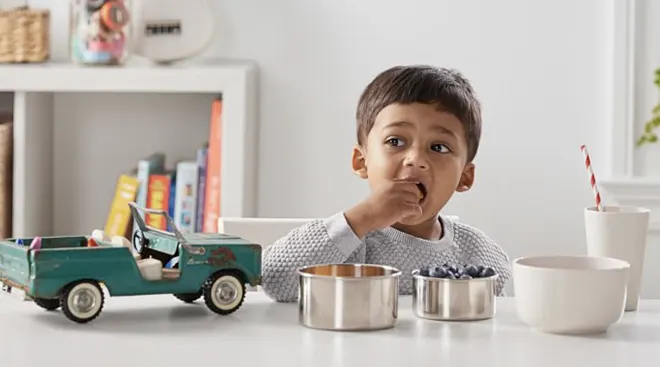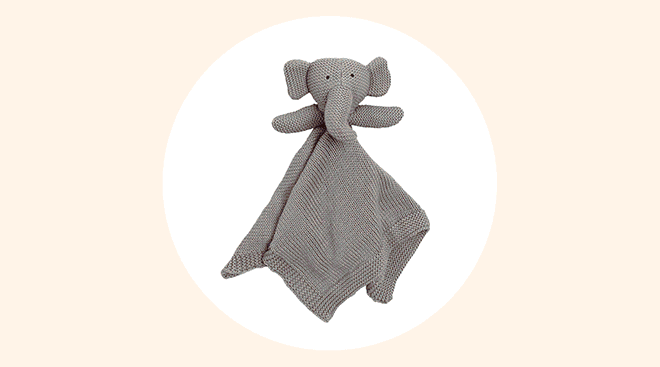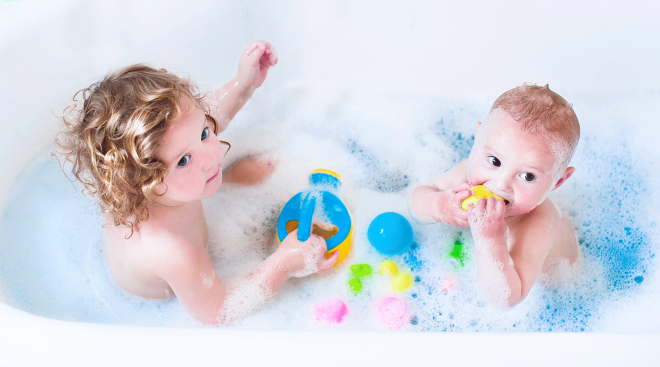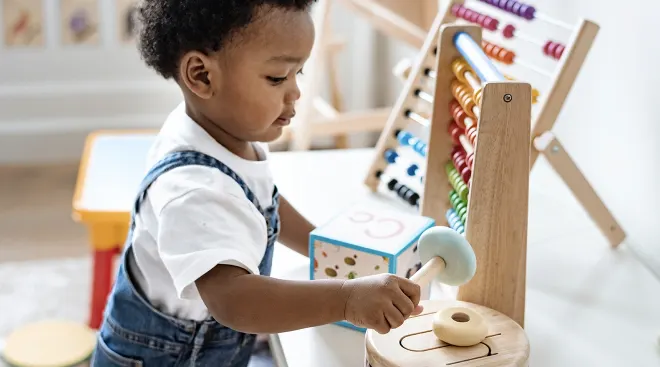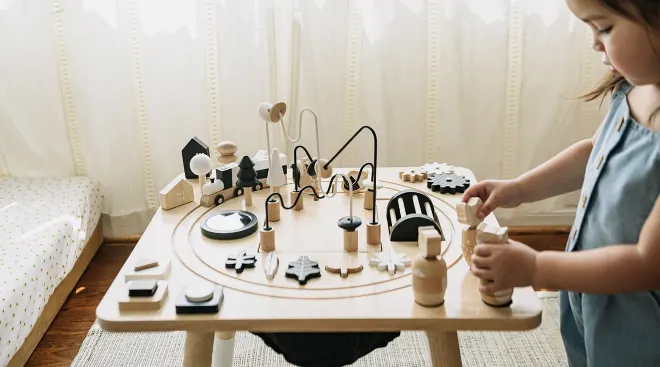- Pregnancy
- Baby & ToddlerRECOMMENDED READING
- Parents
- Getting Pregnant
- Baby Names
- Product Reviews
- RegistryRECOMMENDED READING
- Community
12-Month-Old Baby
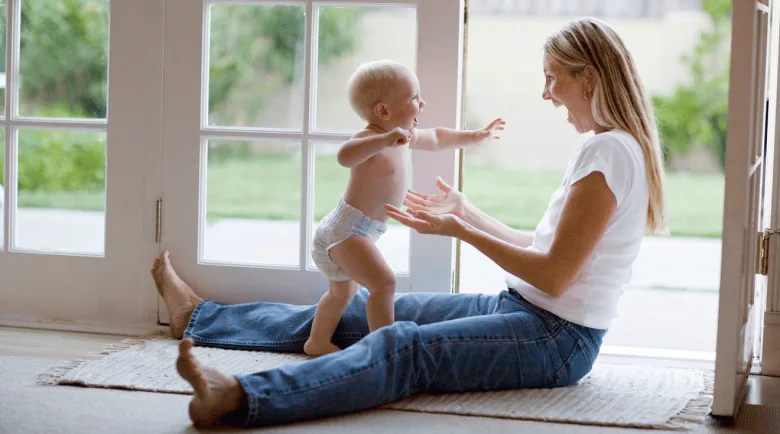
Happy birthday, baby! You’ve now got a one-year-old on your hands! Baby’s been on an amazing journey—and so have you, watching baby advance from rolling to cruising to maybe even walking unsupported. (If baby’s not there yet, don’t worry. Many toddlers start walking long after their first birthday.) Your little one is probably pretty social now, waving “hi” and “bye” and likely using most one-year-olds’ favorite word, “no,” while shaking their head. Make way for toddlerhood!
You and your 12-month-old baby deserve a big pat on the back. The last year has certainly been an exciting (and challenging!) one for you both. While you’ve likely become extremely confident in your role as a parent and caregiver, there’s a good chance you still have some questions about baby’s development. Want to know what to teach your 12-month-old baby, how to discipline them and which activities are best for a budding toddler? We’ve got you covered. From 12-month baby milestones to a 12-month-old sleep schedule, we’ve got the scoop as you ring in baby’s first birthday!
- This is a month of big transitions! For starters, it’s time to start weaning baby off the bottle and introducing them to a sippy cup or straw cup. The transition can be gradual, but it’s best to do this by the time your little one’s 18 months old.
- Baby will likely take their first steps by the time they’re 18 months old. So don’t worry if they’re not walking yet—there’s still plenty of time!
- At 12 months old, baby’s likely saying mama, dada and at least one other word. Encourage baby’s language development by reading to them every day. If you speak a second language, make sure to use it around baby.
How much does a 12-month baby weigh and how tall are they? The average weight for a one-year-old baby is about 20.9 pounds for girls and 21.3 pounds for boys. The average height is 29.1 inches for girls and 29.8 inches for boys. Baby’s probably tripled their birth weight and is about 10 inches longer (aka taller) than they were at birth.
Baby’s probably still growing about a half inch each month and gaining around three ounces per week. But keep in mind that all babies will grow at their own rate—while some babies may go through a growth spurt right around 12 months, others’ rate of growth may start to slow down as they enter toddlerhood.
Do you find yourself wondering, “What should my one-year-old be doing?” Here are the skills baby may be working on this month:
- Sitting. Baby’s probably sitting for longer periods of time and can twist and turn to reach different toys.
- Standing. At this stage, about half of babies can stand for a few moments without support.
- Walking. About one out of four babies this age are starting to walk. But don’t fret if yours isn’t. The normal age range of first steps is anywhere from 9 months to 18 months, so it’s still pretty early for your toddler (eek!) to be walking.
- Talking. Baby’s probably saying "dada,” "mama" and at least one other word. (And yes, if you understand what they mean, it counts as a word!)
- Understanding. Baby’s like a sponge right now—absorbing and trying to make sense of everything around them. They’re beginning to tie words to their meanings. Baby also understands one-step commands, such as when you ask them to pick up a ball or look at the dog. This is also a good time to continue teaching them the meaning of the word “no.”
12-month-old sensory development
- Baby’s hearing is now super-accurate, and they listen with closer attention than they used to.
- They love to look and listen at the same time, making reading books really fun and interesting.
- Baby loves feeling different textures and cool sensations such as the feeling of water pouring from cup to cup in the bathtub.
- Your tactile little one’s continuing to feel everything with their hands and mouth.
“Separation anxiety can be difficult to manage, but is considered part of normal development. Reassurance and calming of your toddler frequently may be necessary as they begin to discover the world around them.” — Robert Quillin, MD, board-certified pediatrician and medical director at Pediatrix Medical Group in Fort Worth, Texas
As they reach the one-year milestone, here are some health concerns parents may have:
CPR
If you haven’t learned how to administer infant CPR, now’s the time to do it. The best way to learn the different techniques is by taking a CPR class, which you can find through the American Red Cross website, or by asking baby’s pediatrician for a referral.
Changes to bowel movements
As you continue to introduce your 12-month-old to new foods, you’ll likely see changes in the color and consistency of their poop. In some cases, it may even lead to a change in frequency (if you suspect constipation, be sure to contact your pediatrician).
This is also true as you transition baby to cow’s milk when they reach 12 months old. However, if you notice baby’s experiencing frequent diarrhea or loose stools after drinking cow’s milk, and if they’re also showing signs of tummy discomfort, like bloating and gas, that may be a sign of dairy intolerance. If your little one shows these symptoms, contact your pediatrician.
Asthma
Asthma affects more than six million kids in the U.S., according to the AAP, and is the most common chronic respiratory disease in children. Asthma typically starts showing up in children before age 5, and about half of kids will outgrow their symptoms as they get older (although symptoms can come back in adulthood). Signs of asthma include coughing (especially at night or early morning), breathing problems like shortness of breath, rapid breathing, or gasping for air, wheezing, fatigue, irritability and dark circles under the eyes.
At 12 months old, if baby’s pediatrician suspects asthma—or, most likely, reactive airway disease, aka asthma-like breathing problems without an official diagnosis—in addition to considering your little one’s medical history, they may do a physical exam, order a chest X-ray and/or suggest trial medications. Once your child is old enough (7 years old, according to the AAP), the doctor can do lung function tests to help confirm a diagnosis.
Identifying vision and hearing problems
Signs your 12-month-old may be having trouble hearing can include delayed speech, or age-appropriate speech that’s hard to understand. Also, if baby doesn’t respond to loud sounds, doesn’t notice you entering a room until they see you, or if they focus on making vibrating or gurgling sounds that they can feel (rather than hear), this could indicate that they have a hearing issue. Similarly, if they seem to hear some sounds but not others, that could be a sign of hearing loss in one ear and not the other.
Monitoring baby’s vision can be a little more difficult, and in some cases, there are no outward symptoms. However, some things that should prompt a call to the doctor include eye misalignment (look crossed, turn out, or don’t seem to focus together), eyes that flutter quickly from side to side or up and down, white or grayish coloring in the pupil, pain, itchiness, or redness in the eye, eyes that are overly sensitive to light, drooping eyelids, watery eyes, or pus or crust in either eye.
Checkup and vaccines
There’s a 12-month appointment included in the AAP’s schedule of baby and child well-visits. During this appointment, baby’s pediatrician may check them for anemia and test their blood lead level. They’ll also do a standard physical exam, weigh and measure baby to make sure their growth is on track and screen baby’s vision. Baby may also receive vaccines for measles, mumps, rubella (MMR) and chickenpox. Baby’s doctor may also recommend the hepatitis A vaccine and/or the fourth dose of the Hib and PCV13 vaccines, but those could also be given at the 15-month checkup. You may also be offered the flu shot, depending on the time of year.
Your pediatrician will talk to you about baby’s development and behavior at this appointment. By 12 months old, at least 75 percent of babies can play games like pat-a-cake, wave bye, call a parent “mama” or “dada” (or a similar special name), understand the word “no,” put objects into containers, look for hidden objects (like a toy you placed behind your back), pull up to stand, cruise or walk while holding on to furniture, pick things up using their pointer finger and thumb, and drink from a cup without a lid (with a parent holding it).
In addition to formula or breast milk (and maybe even a little cow’s milk), your one-year-old is eating three meals and about two snacks per day. One-year-olds are notorious for not eating a lot, so don’t worry too much if baby’s appetite starts to lessen over the next couple months. You can expect your child to eat about a quarter of a cup of each food group at every meal. Don’t worry too much about having them join the clean plate club. One-year-olds are very good at judging when they’re hungry and when they’re full, so if they stop, they’ve had plenty to eat.
What can baby eat and drink this month? Your 12-month-old baby can eat most things you do! So long as it’s nutritious, not a choking hazard and soft enough to gum if they don’t have many teeth yet. (Check out some finger food ideas, here!)
“Can my 12-month-old baby drink regular milk now?,” you ask? Yes! Baby’s digestive system should be ready for cow’s milk, so you’re welcome to introduce it slowly. So how much whole milk for a 12-month-old baby? Start with just a little bit—maybe add a few ounces to their formula or breast milk at each feeding, or offer a small cup at snack time. It might take a little while for baby to get used to the taste. Some babies, however, love the taste of whole milk from the get go. Just remember, you don’t want baby to get all their calories from milk; most pediatricians recommend limiting milk intake to 16 to 24 ounces a day at this point.
Sleep is still a big priority as baby turns into toddler. Your one-year-old is hopefully sleeping through the night now—but if that doesn’t always happen, keep in mind that’s normal.
12-month-old sleep schedule
How much sleep should a 12-month baby get? One-year-olds still likely sleep about 13 to 14 hours per day. Roughly 10 to 11 of those hours are probably at night. A typical nap schedule for a one-year-old baby consists of two naps that total three hours of daytime sleep, but of course, how often baby naps and when will vary.(Sometime before their second birthday, they’ll probably switch to just one nap per day, in the afternoon.)
Baby’s awake for three to four hours at a time now—which means lots of active time. A 12-month-old baby’s daily schedule might look something like this:
Baby is learning more about the world around them every day, so you might be wondering: “What activities can I do with my 12-month-old—and what should I teach my one-year-old baby?” Here are a few ideas:
- Teach baby new words. Use picture books to help baby learn the names of animals and the sounds they make. Point to different body parts, like their hands, face and arms to encourage baby to learn the appropriate words for each. And don’t forget to emphasize the names of friends and family members.
- Encourage independence. A 12-month-old baby will begin wanting to do things independently. Whether they want to take off their own socks or use a spoon to eat yogurt, be flexible and let baby have some freedom. Supervise without intervening and cheer baby on to boost their self-confidence.
- Go outside and play! Toddlers love textures, so have baby go barefoot and crawl or walk around the yard to really feel the grass beneath their hands, knees and feet.
This is a crucial time: Baby’s becoming more active and independent, and you’re (hopefully) finding a bit more self-care time. Ahead, how to take care of yourself and baby at the one-year mark.
Postpartum recovery tips
- Keep up the pelvic floor work. Now that you’re a year out from childbirth, your body is likely no longer rapidly transforming like it was in the early postpartum period. Still, it’s important to continue to monitor and strengthen your pelvic floor, as well as do core exercises if needed. You may also continue to experience stress incontinence, an overactive bladder or stool leakage—make sure to seek the help of a pelvic floor therapist if you have any of these issues.
- Keep up the self-care. Self-care continues to be essential for parents, even once you reach the one-year mark. It can be difficult to find time to take care of yourself, though, so making a plan can help. Set aside time in your schedule for self-care (whether it’s 15 minutes or an hour), and make a list of your self-care priorities to ensure you stick to activities that will truly help you fill your tank (basic hygiene or marking an item off your to-do list do not count).
12-month-old baby care tips
- Playground safety. Just because baby’s almost a toddler doesn’t mean they can play on the big kids’ equipment. Look for play places that have more options for movement compared to a baby-centered space, but try to avoid letting your little one play on sets that are designed for older kids because that can easily lead to injury. Additionally, avoid metal slides that can get too hot in the sun, and never go down the slide with baby on your lap, as this puts them at risk of leg injury.
- Dealing with tantrums. Welcome to the age of temper tantrums! These are to be expected in the toddler years as your little one feels a need for independence and becomes frustrated when they don’t get their way—and aren’t able to fully communicate what they want. As a parent, it’s important to try to remain as patient as possible (easier said than done, we know) during a tantrum, and to try to redirect your child’s attention or possibly help them communicate their need better (“Can you point to the snack you want?”). You can also try to avoid tantrums by planning ahead (example: don’t take them out for errands close to nap or mealtime) and offering them choices to give them a sense of control (example: “Would you like to wear the red shirt or the yellow shirt today?”).
- Pet safety. As baby starts to transition into toddlerhood, it’s helpful to reinforce boundaries with pets—whether it's your family pet or cute pups they come across on a walk. Make sure to supervise interactions between their baby and pets, and remind baby not to stick their arms through fences to pet a neighbor’s (or stranger’s) dog. You should also teach them when it's safe to approach their pet, versus when they should give it space.
You’ve come a long way with baby! Get inspired by the triumphs, struggles and advice of other 12-month-old baby parents, here:
- Win: “I thought the transition to cow’s milk would be so hard, but my baby guzzled cow’s milk to the point where I was looking up the upper limit of how much he was allowed per day. (That’s no more than 24 ounces, by the way.) With all the transitions that are really hard around the one-year mark, at least one was easy.” — Natalie Gontcharova, Senior Editor, The Bump
- Challenge: “My one-year-old still isn't sleeping through the night. She's actually never slept through the night, and I'm exhausted. I've gone back to work and she's been waking up four to five times through the night recently. She still comfort-nurses through the night. I've tried to quit night nursing cold turkey, but she just screams to the point of hyperventilating.” — mydreamworld1005
- Wisdom: “One is such an interesting age to me, because they’re all on such different levels. I've noticed with my friends’ kids that some one-year-olds definitely act more ‘toddler-y’ and some still act more ‘baby-ish.’ I think my son is more on the baby side. He still crawls, babbles a lot, eats purees and drinks bottles. But I'm perfectly content to let him stay in this baby stage for now, and leave the walking, talking and cup-drinking until later. I feel like I get to hold on to his baby ways for at least a few more weeks.” — jillybean800
“Deciding how many kids to have is deeply personal, and several factors can go into making this decision, like finances, fertility, energy and general desire. Even though my husband and I both come from larger families, we felt like ours was complete with our two sons.” — Katie G., mom of two in Indiana
Frequently Asked Questions
What if my 12-month-old isn’t walking yet?
If you’ve reached the 12-month point and your little one isn’t walking, there’s absolutely zero need to panic. It’s completely normal for babies and toddlers to start walking anytime from 9 months old to 18 months old. If your toddler has progressed from crawling to pulling up and cruising by this point, they’re definitely right on track.
What are the signs of autism at 12 months old?
Potential signs of autism spectrum disorder (ASD) at 12 months old may include lack of eye contact, not responding when their name is called, not showing facial expressions when they’re feeling big feelings (anger, happiness, surprise, sadness), not playing simple games like pat-a-cake, using few or no gestures (such as waving), demonstrating restricted or repetitive behaviors and interests (only plays with certain parts of a toy, lines their toys up, gets upset by minor changes, flaps hands, rocks back and forth, or spins in circles), and showing delayed development in other areas such as speech, movement or learning. Keep in mind, children without ASD can show some of these symptoms as well, and some kids with ASD may not show any of these signs. If you suspect ASD, be sure to talk to your child’s pediatrician and request a screening.
Should I switch to toddler formula?
Unless your pediatrician suggests otherwise, toddler formula is not only not required, but not recommended. (The AAP says it has no nutritional benefits.) At 12 months old, baby can transition from breast milk or baby formula to cow’s milk.
What are the benefits to extended breastfeeding?
When to wean baby is, of course, a personal choice. But continuing to breastfeed past the 12-month mark provides your child with good nutrition and immune support. It also continues to strengthen the mother-child bond, and can act as a source of comfort and security. Check out more benefits of extended breastfeeding here.
Should I move baby to a toddler bed?
There’s no set age for transitioning baby from a crib to a toddler bed. But there’s an important safety consideration: The AAP recommends moving baby out of a crib once they’re tall enough for the railing to reach below their chest when they’re standing, as at this point it would be easy for them to climb out and risk injury.
There’s a lot to celebrate as your little one hits their 12-month baby milestones. The past year may seem like a blur, but there’s so much more excitement on the horizon. Take some time to reflect on baby’s journey and prepare for the adventure of raising a toddler.
Please note: The Bump and the materials and information it contains are not intended to, and do not constitute, medical or other health advice or diagnosis and should not be used as such. You should always consult with a qualified physician or health professional about your specific circumstances.
Robert Quillin, MD, is a board-certified pediatrician and the medical director at Pediatrix Medical Group in Fort Worth, Texas. He earned his medical degree from University of Texas Medical Branch at Galveston, Texas.
American Academy of Pediatrics, Child and Adolescent Immunization Schedule by Age, October 2023
American College of Obstetricians and Gynecologists, Optimizing Postpartum Care, May 2018
American Family Physician (Journal of the American Academy of Family Physicians Foundation), Risks and Benefits of Pacifiers, April 2009
American Optometric Association, Infant Vision: Birth to 24 Months of Age
California Department of Education, Ages and Stages of Development
Centers for Disease Control and Prevention, Cow’s Milk and Milk Alternatives, May 2022
Centers for Disease Control and Prevention, Important Milestones: Your Child by One Year, June 2023
Centers for Disease Control and Prevention, Signs and Symptoms of Autism Spectrum Disorder, May 2024
Centers for Disease Control and Prevention, Signs Your Child Is Hungry or Full, July 2021
Centers for Disease Control and Prevention, Toddlers (1-2 Years of Age), February 2021
Child and Family Development, Physical Therapist Tips to Help Your Little One Stand, December 2015
Child Development, Infants' Learning About Words and Sounds in Relation to Objects, January 2003
Cleveland Clinic, A Guide to Childproofing Your Home, October 2022
Cleveland Clinic, Reactive Airway Disease, January 2023
Cleveland Clinic, The Benefits of Reading to Babies, October 2020
Cleveland Clinic, When and How to Sleep Train Your Baby, May 2021
Cleveland Clinic, What Is Sensory Play? The Benefits for Your Child and Sensory Play Ideas, March 2022
Cleveland Clinic, When Do Babies Start Walking?, July 2021
Harvard Medical School, Pregnancy’s Lasting Toll, August 2022
Healthy Children (American Academy of Pediatrics), AAP Advocates for Life Support Training for Children and Adults, May 2018
Healthy Children (American Academy of Pediatrics), AAP Schedule of Well-Child Care Visits, July 2023
Healthy Children (American Academy of Pediatrics), Breastfeeding Beyond the First Year, August 2023
Healthy Children (American Academy of Pediatrics), Checkup Checklist: First Birthday (12 Months Old), September 2021
Healthy Children (American Academy of Pediatrics), Cow’s Milk Alternatives: Parent FAQs, June 2022
Healthy Children (American Academy of Pediatrics), Diagnosing Asthma in Children, March 2021
Healthy Children (American Academy of Pediatrics), From Bottle to Cup: Helping Your Child Make a Healthy Transition, July 2023
Healthy Children (American Academy of Pediatrics), Getting Your Baby to Sleep, August 2022
Healthy Children (American Academy of Pediatrics), Hearing Loss in Children, June 2023
Healthy Children (American Academy of Pediatrics), Importance of Self-Care: Why Parents Need Time Out to Recharge, November 2024
Healthy Children (American Academy of Pediatrics), Playground Safety, July 2023
Healthy Children (American Academy of Pediatrics), Sample Menu for a Baby 8 to 12 Months Old, August 2022
Healthy Children (American Academy of Pediatrics), Warning Signs of Vision Problems in Infants & Children, November 2024
Healthy Children (American Academy of Pediatrics), Why Do Infants Need Baby Formula Instead of Cow's Milk?, September 2023
Johns Hopkins Medicine, Feeding Guide for the First Year, July 2019
Mayo Clinic, Baby Naps: Daytime Sleep Tips, October 2022
Mayo Clinic, How Much Should I Expect My Baby to Grow in the First Year?, January 2023
Mayo Clinic, Infant Development: Milestones from 10 to 12 Months, December 2022
Mayo Clinic, Language Development: Speech Milestones for Babies, March 2023
Mayo Clinic, Temper Tantrums in Toddlers: How to Keep the Peace, October 2022
National Highway Traffic Safety Administration, Car Seat Recommendations for Children
National Library of Medicine, Asthma in Children
Nationwide Children’s Hospital, Transitioning from Crib to Toddler Bed, December 2021
Nemours KidsHealth, Feeding Your 1- to 2-Year-Old, November 2021
New York State Department of Health, Choking Prevention for Children
Sleep Foundation, When to Transition from Crib to a Toddler Bed, October 2023
Stanford Medicine Children's Health, Age-Appropriate Speech and Hearing Milestones
Stanford Medicine Children's Health, Disciplining Your Child at Any Age
Stanford Medicine Children's Health, Infant Sleep
UCSF Benioff Children's Hospitals, Your Baby at 12 Months
University of Washington, Bilingual Babies: Study Shows How Exposure to a Foreign Language Ignites Infants’ Learning, July 2017
World Health Organization, Length-for-Age BOYS 6 Months to 2 years (percentiles)
World Health Organization, Length-for-Age GIRLS 6 Months to 2 Years (percentiles)
World Health Organization, Weight-for-Age BOYS Birth to 2 Years (percentiles)
World Health Organization, Weight-for-Age GIRLS Birth to 2 Years (percentiles)
Learn how we ensure the accuracy of our content through our editorial and medical review process.
Navigate forward to interact with the calendar and select a date. Press the question mark key to get the keyboard shortcuts for changing dates.
Advertisement
Advertisement
Advertisement
Advertisement
Advertisement
Advertisement
































